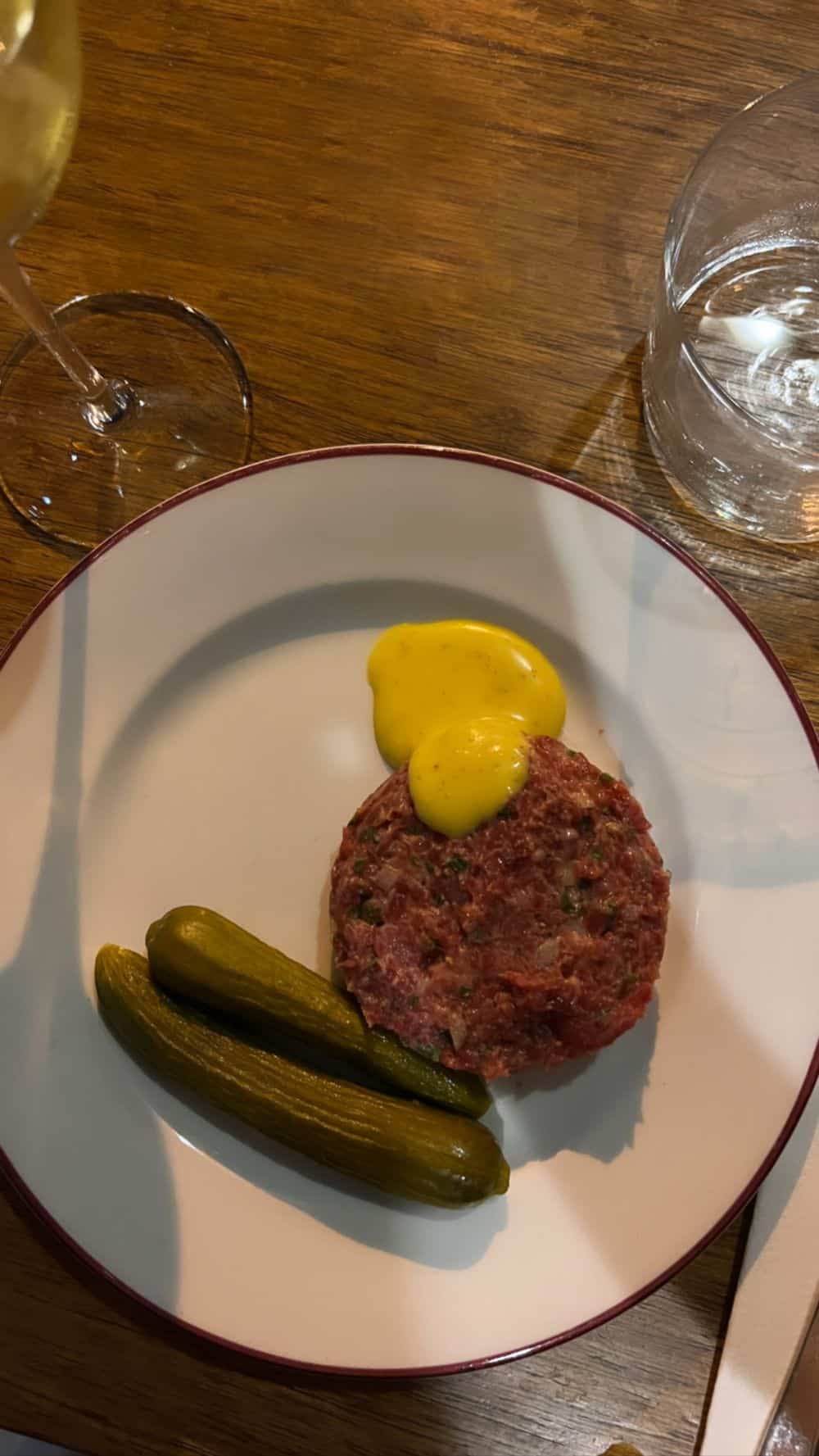
OCD
The OCD experience is as exhilarating as it sounds. Chef Raz Rahav serves just 19 diners around his open kitchen, on display for all to see. Rahav, in obsessive form, also prepares 16-20 plates in a mixture of Ashkenazi, Sephardic, and Middle Eastern inspiration in a sort of communal dinner theater. The tasting menu, which is always a complete surprise upon entry, changes with the seasons, and takes on a minimal waste policy, reimagining vegetable scraps into creative sweet and savory sauces and dishes.
George & John
Chef Tomar Tal’s Ashkenazi and Moroccan roots play out flawlessly at George & John – so much so that he was named a top promising chef by Gault & Millau. The restaurant is housed in the historic Drisco Hotel and serves only fresh catches from the nearby port in Jaffa. Along with enjoying your meal in the stunning main dining room, be sure to sneak a peek of the private dining area. It was here that Mark Twain would come to write his memoirs on his visits to Ottoman-ruled Palestine.
HaBasta
HaBasta is a cozy, bustling hole in the wall right off Carmel Market (which is where chef Elon Amir finds inspiration for his daily menus). Scribbled onto a piece of paper on the wall before service, the seemingly simple menu is actually rather mind-blowing: potato dumplings are elevated beyond conception, succulent baked crabs come in fresh from the Mediterranean sea, and the winter beef tongue mushroom stew warms you from within. Don’t miss the smart wine list, which boasts a variety of natural wines and international bottles.
Animar
Animar is the type of place where you come for the views and stay for, well, everything else. Overlooking the city’s beaches, Chef Hillel Tavakuli’s experience is all about fresh fish and seafood flecked with both Libyan and Persian influence. Here, it’s all about abundant mezze platters designed for communal dining, such as lamb with pickled mango aioli and chili, or tasty small bites like polenta with saffron syrup. You’re in for an extra bit of luck if you can snag a table right at sunset.
Migo & Milbar
Set in a Bauhaus style building from the 1930s, Migo and Milbar is one of the city’s best fish restaurants. Chef Moti Titman spent time in kitchens all around the world, from Berlin to New York, and dishes out vibrant Middle Eastern and Mediterranean fare with plays on Japanese ingredients. There’s no better urban pastime than sitting on the terrace and snacking on a plate of Titman’s miso mussels or seafood fettuccine while people-watching in the heart of Tel Aviv’s theater district.
HIBA
With a two-month-long waiting list, HIBA has quickly become one of the places to dine in Tel Aviv. Chef Yossi Shitrit’s high-level contemporary Arab Israeli cuisine combining history and culture (think veal filet with quince and mustard, or wild sea bass with herb khoresht and black garlic), as well as his intricate and artful plating, is bound to make HIBA a contender for an upcoming Michelin star.
Bellboy/Butler
Messa’s international spread — from a cheesy balkan jibneh to the beef cheek ravioli — is stunning on its own, and even includes a full vegan menu. The restaurant’s award-winning design, then, is simply the cherry on top. The contemporary dining room is completely white and just as stunning, whereas the bar area is the exact opposite: dark, black, and perfectly moody.
Bar 51
Right outside the Ramon Hotel is one of Tel Aviv’s best and busiest wine bars. Industrial decor and a trendy atmosphere set the stage for delicious small plates made from seasonal ingredients sourced from the nearby Carmel Market. Bar 51’s menu showcases wines from all over the world, including Israel, along with glorious cheese plates and loads of seafood, from calamari to fresh fish collar bites.
Dok
Brothers Asaf and Yotam Doktor are not only reimagining Jewish food, but are also taking modern Israeli cooking to new heights. More importantly, they’re taking the phrase “local ingredients only” to the limit: other than sugar and peppercorns, they source absolutely everything locally. They even press some of their own small-batch olive oil and mill their own flour. The brothers’ work with backyard growers and cooperatives has led to an ever-evolving menu that explores the complex foodways of the Jewish diaspora, making it a must-try spot while in Tel Aviv.
Embrace Tel Aviv’s Cutting-Edge Ingredients
Tel Aviv’s culinary innovation will stop at nothing, and that includes the search for delicious, sustainable options. The proof is in its dedication to research and technology: Israel is soon to be a top investor, producer, and seller of cultivated meat.
While you’re on your gastronomic journey through Tel Aviv — whether it’s mezze plates over natural Israeli wines or small bites on an award-winning tasting menu — keep your eyes open for cutting-edge innovations like cultivated meat.
